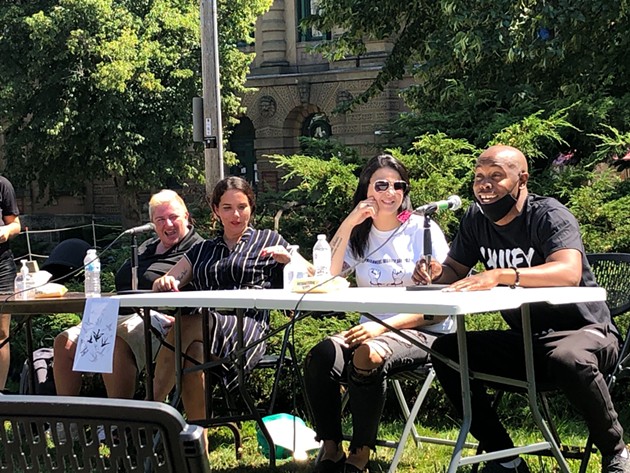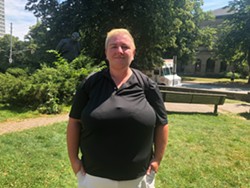
Sara Tessier was a toddler when her father sexually assaulted her. She says she was sold to a man in Montreal when she was only 3. When she tried to speak up and seek help, her father shot himself. She says the courts later returned her to the custody of her father who was still alive after the shooting. The abuse continued. Tessier had spoken to different people about it but got no help. Finally, at 15, the vice-principal of her high school took action and called the police’s attention to her abuse. Later on, Tessier was placed in a foster home. “But at that time, it really took away any trust that I would have in anybody,” she says.
Many years later, Tessier was sentenced to eight years in federal prison for armed robbery—a crime she says was a result of the trauma from her childhood.
On Monday, Tessier told her story at a panel discussion outside of the Halifax Provincial Court organized by Books Beyond Bars, to mark Prisoners’ Justice Day. She joined others in Halifax who had been previously incarcerated to an audience about their lived experiences in prison.

Tessier says she fought for over three years to have mental health services while she was in prison before she finally got them. “Trauma-informed therapy is what is needed, but not in prisons,” says Tessier. Instead, there should be community funded resources where people can get help.
She says the prison system in Canada is filled with injustice. “It really sparked my passion to help others and to provide a voice for those who don’t have it,” she says.
After spending five years in a correctional facility, Tessier, now 46, advocates against imprisonment, something she started when she was incarcerated. “It all started with helping people fill out grievances and complaints, to being hired on as a legal peer support advocate with Elizabeth Fry Society,” she says.
She hopes the event brings awareness to people about how flawed the system is. “I want them to know that it’s not just a place where people go and get better. It’s not designed for that,” she says.
Tessier says she as well as other women were sexually assaulted by the same guard in prison. “Being in prison is not a healing experience. It’s rather traumatic and it adds to people’s trauma that they’ve experienced their whole lives,” she says.
Cecilia Masimo, a volunteer at Books Beyond Bars and one of the organizers of the event, says putting people in prisons without help is counterproductive. “How can we expect people who have done wrong to reach some type of retribution or some type of accountability?” she says.
She says the current prison system actually creates more criminals, adding that most people in prisons are Black and Indigenous and racism is at the root of their being there. A report released by Statistics Canada this year said that over 30 percent of Canada’s federal inmates were Indigenous, even though Indigenous adults only make up 5 percent of the country’s population.
Masimo also says most people commit crimes because of societal issues like poverty. “If we solve a lot of the key issues in society in terms of making sure people have a home, have a space to stay, have food, have kind of their basic needs met, crime would significantly drop down,” she says.
She says even if a prison system needs to be in place, it should involve a community determining the reason a person commits a crime. “And then also helping them find a way to reconcile it whether that means them spending some time away or it’s by individual case,” she says. “People should be treated well and people should be given the grace, given time to properly understand why they’ve done wrong if it’s even wrong in their eyes.”
She hopes that by people sharing their lived experiences about their time in incarceration, the government takes notice and makes the change they’re seeking. “Nothing is set in stone. Society was created. It can also be dismantled and then recreated again in a better vision,” she says.
Three other panellists shared their incarceration stories outside the courthouse.
Patricia Whyte, an Indigenous woman says she got sentenced to four years in prison for the first crime she ever committed, saying she was tagged as a gang member with no proof because of her race. “Dealing with racism I feel was probably my biggest issue while I was in there,” she says.
Mother of two, Nicole Tobin was handcuffed by the police in the presence of her three-year-old after she asked them to not do so. Tobin who was pregnant at the time says she was placed in a dark room separate from every other person. “I was left there for 24 hours. No food, no medication,” Tobin says.
“At the time I committed the crime, I was being physically abused, sexually abused and emotionally abused,” Tobin says all of those complaints were dismissed in court.
And Corey Wright, who’s been in prison twice, says he never got the help he needed when he was in prison. “It’s designed to hold you, designed to break you, designed for you to think that there’s no other way besides prison,” he says.
He says the system needs to look for the positives in the crimes people commit and work with those positives. “Okay, I like selling drugs,” he says giving an example, “So that means I’m good at retail. So flip me over here and do something,” he says. “Do something over here with me to shift my mind into an entrepreneurial business or something.”
Another volunteer at Books Beyond Bars, Nicole Maunsell, says crimes such as drug use and sex work need to be decriminalized. “Alternatives look like supporting people who have addictions, supporting people who feel like they have to do sex work to survive,” she says.
Maunsell says although there are people who happily choose to do sex work, others don’t. “And so, alternative support for those people, is one of the things that would be better because then you’ll see less of these problems,” she says.
